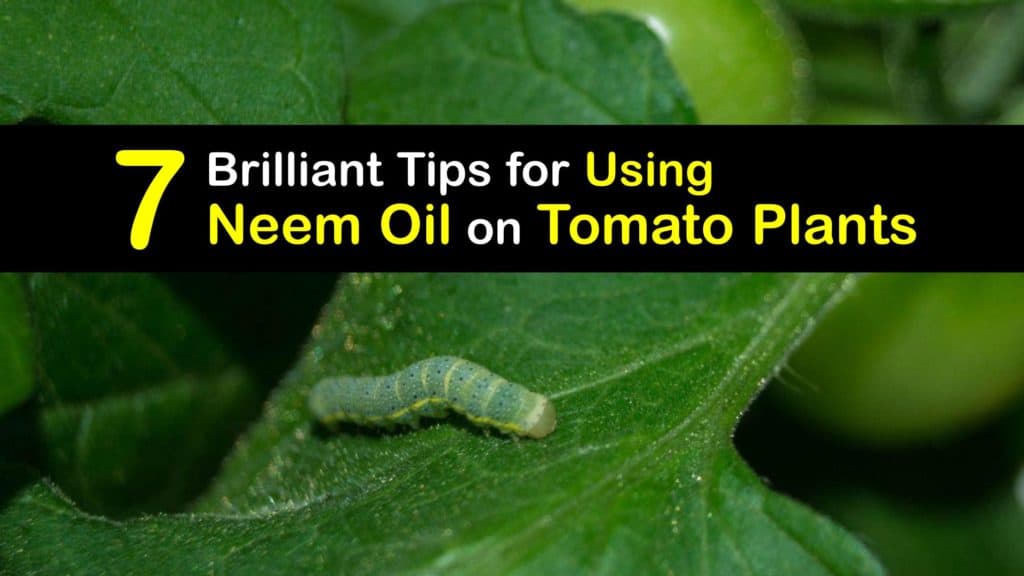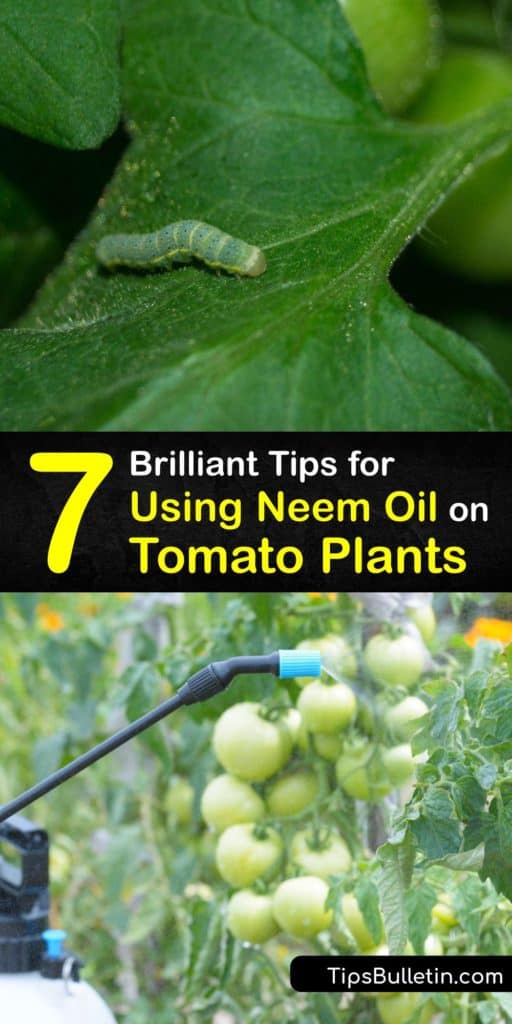Neem oil is an organic vegetable oil created by cold-pressing seeds or fruit from the neem tree. In gardening, neem oil is popular for its use as an insecticide and its antifungal properties. To get full advantage of neem oil, learn how to use neem oil on tomato plants safely.
In its native country of India, neem oil has a long history of use in folk medicine. Over time neem oil has become a favorite for gardeners to keep pests away and treat fungal diseases in crops like tomato plants.
Tomatoes are among the most popular types of fruit by both humans and insect pests. Aphids, spider mites, and tomato hornworms are some of the common tomato pests that target your tomatoes. Continue reading to learn more about using neem oil on tomato plants.

Uses of Neem Oil for Tomato Plants
As an oil, neem oil is versatile enough to combine with water and household ingredients to create simple yet effective insecticides. Popular uses of neem oil for citrus trees and soil in the garden include foliar sprays and a neem oil soil drench to repel or kill harmful insects in your garden.
Why Use Neem Oil on Tomato Plants?
Neem oil is an excellent product to use on tomatoes, as it repels and kills various garden pests that prey on tomato plants. Neem contains azadirachtin, a chemical compound that deters insects from feeding.
Once ingested, it interferes with the life cycle of insects—resulting in insects being unable to molt and progress to the next cycle in their lives. Azadirachtin in insects interferes with their ability to mate and lay eggs.
Aside from its importance as an insecticide, using neem oil for tomato plants is perfect because it helps boost plant immunity, even in mature plants. It can also deter fungus and mold that might otherwise plague tomatoes in storage.

Is Neem Oil Safe for Tomato Plants?
Because of its reputation as a pesticide, it’s normal to wonder if it’s safe to use neem oil for tomato plants. When applying any treatment to your plants, consider the long-term effects they have on the edible plant fruits.
Neem oil is more than just a pesticide as it contains antifungal properties that help plants fight off issues like root rot, leaf spot, mildew, and tomato plant leaves curling. Neem oil also contains fatty acids and micronutrients to help plants grow and remain healthy.
Neem oil is not toxic or harmful to humans and animals like pets and birds in small amounts. It’s safe to treat tomato plants with neem oil up to 24 hours before harvesting.
Using Neem Oil to Treat Powdery Mildew
Powdery mildew is a disease that infects tomato plants and develops spots on your plants’ leaves. Mildew is easy to spot on tomato plants because of its white powdery appearance, like powdered sugar. If left untreated, the fuzzy mold spots lead to the death of leaves on your plant.
Use neem oil to control powdery mildew and other plant diseases like rust spots. Pure neem oil needs mixing with water to apply to plants and an emulsifier like soap to mix well.
Mix liquid soap with water before adding neem oil to the spray bottle. Treat your tomato plant leaf with the spray to kill fungal inoculum on contact.
Note: Horticultural oil is an alternative to neem oil.
Treating Tomato Plants with a Neem Oil Soil Drench
Another method for treating powdery mildew is to create a neem oil soak for your tomato plants. Absorbing the neem oil through its roots allows the oil to work through the plant’s system. Using a soak is efficient because it requires less frequent treatments when controlling powdery mildew.
If your plant is under attack from various garden pests, a soak is an effective way to kill and repel insects, too. Treating the area around your tomato plants with a neem oil soak benefits nearby companion plants as well that are dealing with pest issues.
Mix water and soap in a bucket before mixing in your cold-pressed neem oil. Use at least two cups of your neem oil mix for tomato plants once a month to kill bugs that find your tomatoes attractive.
How to Use Neem Oil on Tomato Plants to Control Leaf Eating Pests
The most common usage for neem oil on tomato plants involves treating plants for pests. Treating with neem oil insecticidal soap allows neem oil to stick to the foliage of your tomato plants.
Insects that feed on your plant’s leaves, like flea beetles, are repelled from feeding on your plant due to the taste and smell of neem oil. If you have an aphid infestation, since aphids like tomato plants, using a neem oil insecticide is the best pest control because it kills soft-bodied insects like whitefly larvae or other small white bugs on contact.
It’s easy to make the best DIY bug spray for tomato plants. Mix your ingredients, leaving neem oil for last, and spray the tops and underside of your plant’s leaves. Spray any insects present on your tomato plants as well.
Pest Control for Leaf-Footed Bugs
Stink bugs and leaf-footed bugs are insects that feed on fruits, nuts, and fruiting vegetables of plants; however, the damage they cause is minor compared to the harm they cause tomatoes.
Tomatoes damage depends on the size of the tomato when the bug starts feeding on it. Small tomatoes affected by stink bugs may drop from the vine, and other tomatoes may never reach maturity. Stink bugs and leaf-footed insects are large enough to pick off by hand when you find them crawling on your plants.
Stink bugs are known for emitting a foul-smelling odor as a defense mechanism. To avoid the smell, and exert stink bug control on tomatoes, spray nymphs with a neem oil spray. Neem oil does not kill adult stink bugs.
When to Spray Neem Oil on Tomato Plants
Because neem oil effectively kills and repels insects, knowing when to spray neem oil on tomato plants is crucial. The importance of how and when you treat tomatoes ensures you do not adversely affect beneficial insects.
Beneficial bugs like fungus gnats, honey bees, and ladybugs visit the flowers of plants and transfer pollen. This intervention allows plants to produce fruit and seeds.
When treating tomato plants, it’s crucial not to spray beneficial insects to avoid repelling them from your garden or accidentally killing them. Treat your plants with neem oil at dawn or dusk to avoid the activity of beneficial bugs. Neem oil is not toxic to ladybugs if you use care in its application.
Is Neem Oil Safe for Humans?
When using a product designed to kill insects, it’s smart to question whether the product is safe around humans and how to handle it. Compared to synthetic insecticides, neem oil is safe for vegetables and human consumption without severe risks from simply applying the product in the garden.
Although neem oil is safe for humans, use it with gloves because skin contact with neem oil results in irritation. Neem oil has a strong smell that is similar to garlic or sulfur. When mixing neem oil with water or treating indoor plants, use it outside to avoid the smell overwhelming your home.
Purchasing organic neem oil from a garden center or nursery allows you to arm yourself with an all-purpose gardening tool. To tackle pest infestations, create homemade neem oil mixes and stick to a schedule to eliminate harmful insects from damaging your plants.

If you learned how to use neem oil on tomato plants, please share our tips on when to spray neem oil on tomato plants with your friends on Facebook and Pinterest.